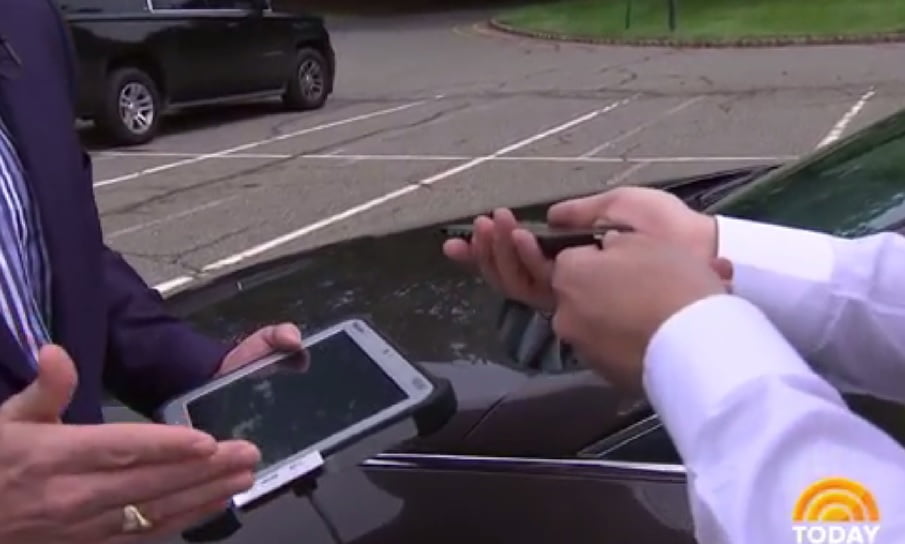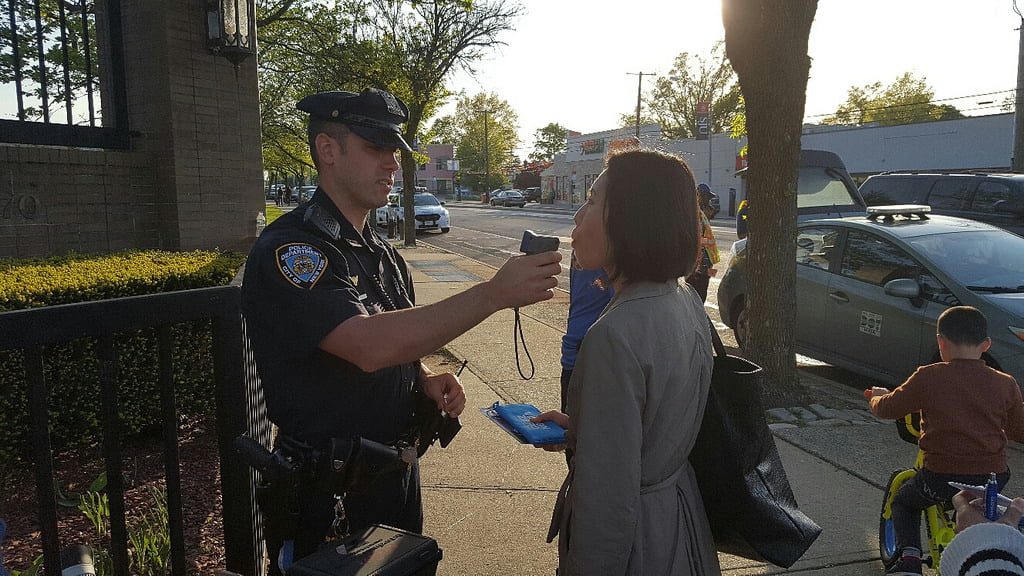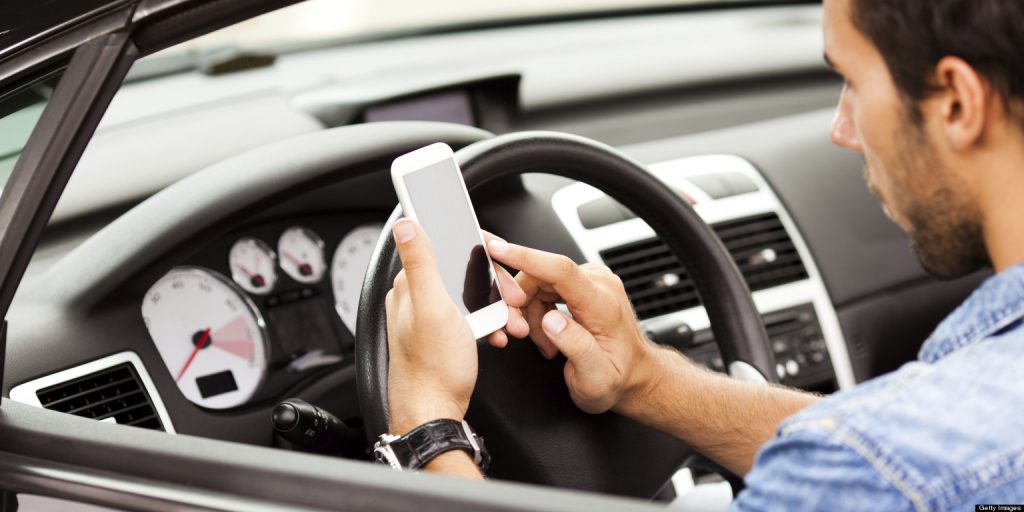Law enforcement agencies across the world have been on the frontlines in recent years of a global, dangerous epidemic wreaking havoc on the roads: accidents and even deaths caused by distracted drivers on their phones while operating their vehicles. In an effort to help curb the phenomenon, the Israeli company Cellebrite, a leading digital forensic firm with a focus on mobile tech, has developed a “breathalyzer for texting” that is now being sought by these agencies as a deterrent for inattentive drivers who are putting themselves and others at risk.
The Petah Tikva-based Cellebrite this year rolled out the “textalyzer,” a device plug-in that reveals whether drivers were on their phones at the times of their collisions, pinpointing what apps they were using and at the the precise time, and whether they were texting or making calls. The device’s software, says Cellebrite, detects the data without necessarily retrieving the specific content. This information usually requires a warrant to obtain, a process which can take weeks, sometimes months.
In May, New York State lawmakers said they were considering bipartisan legislation that would effectively force drivers to consent to a textalyzer test in the event of a collision. The proposed bill, S6325A would allow for the use of Cellebrite’s device and technology, and was approved by the state senate’s committee on transportation, pending further approval by the finance committee. At least three other states — Tennessee, New Jersey, and Illinois — were considering similar proposals, according to a report in Fortune magazine earlier this year.
SEE ALSO: Israeli Company Cellebrite Said To Help FBI Crack Terrorist’s iPhone
The NY bill could become known as Evan’s Law, named after 19-year-old Evan Lieberman, who was killed in a 2011 car accident later found to have been the result of a driver who was distracted by the use of his phone. His father, Ben Lieberman, teamed up with Cellebrite to develop the device after finding out “the hard way,” as he told NPR earlier this year, how difficult it was to obtain phone records. It took a lawsuit and at least six months of court proceedings, Lieberman told US media, calling it an “agonizing process.”

textalyzer system via screenshot from video below
Lieberman and Cellebrite representatives demonstrated the textalyzer system before New York lawmakers this year as the bill moved through the NY senate. The bill would not criminalize drivers who refuse to submit to the field test but they could get their license suspended.
“The device will detect swiping and typing, but doesn’t even have the capabilities to get personal content, not even if it wanted to,” said Lieberman, who has since become an advocate against distracted driving. The sentiment was echoed by CEO of Cellebrite USA, Jim Grady, who told the Associated Press that “for this device, the whole purpose is not to get any data.”
The device has generated controversy and has been met with some resistance by privacy advocates, who argue that it is too intrusive and can lead to privacy violations as police officers would be exposed to sensitive personal data such as text messages, contacts, and call logs.
Sign up for our free weekly newsletter
Subscribe“There’s no guarantee a device like that would be able to scan a phone without collecting private information on one’s phone and there is also no way to ensure accuracy,” Rashida Richardson of the New York Civil Liberties Union told the AP.
These concerns have considerable weight given that Cellebrite offers a variety of Universal Forensic Extraction Devices (UFED), such as UFED Ultimate which the company boasts, “enables the physical, logical and file system extraction of all data and passwords – even deleted – from the widest range of mobile phones, portable GPS devices and tablets.”
Other Cellebrite forensic services include UFED Cloud Analyzer, on which a customer is quoted as saying on the company’s website: “While assisting a local law enforcement agency with a recent criminal investigation, we were able to utilize Cellebrite UFED Cloud Analyzer to remotely collect Google location data pursuant to a search warrant. Within minutes of collecting the location data, we were able to confirm for the investigators that the suspect’s phone was within feet of the 12-year-old victim’s home and we were able to trace the suspect’s movements after he left the scene.” Thus, while the technology can be used to deter texting-while-driving, its pervasive reach should not be overlooked.
Grady has meanwhile countered that police “police won’t be able to [retrieve any data], unless they rewrite our code.”

A New York Police Department officer administers a breathalyzer test. (Credit: New York City Department of Transportation/Flickr)
SEE ALSO: NSO, The Shadowy Israeli Company Helping Governments Hack Phones, Now Worth $1B
Cellebrite, founded in 1999, made international headlines last year after it helped the FBI crack the iPhone used by the terrorist involved in the San Bernardino, California shooting in 2015 in which 14 were killed and 22 were injured. The terrorist, Syed Rizwan Farook, who committed the massacre along with his wife Tashfeen Malik, had been using an iPhone which was password protected and which agents needed to access for their investigation into any accomplices. Apple had refused to unlock the iPhone, citing privacy concerns.
Cellebrite’s technology has garnered interest from government agencies across the world. This month, Australia’s Immigration Department and the Great Barrier Reef Marine Park Authority were just two of the latest agencies to confirm that they had bought the Israeli company’s phone-hacking technology.
Related posts

Editors’ & Readers’ Choice: 10 Favorite NoCamels Articles

Forward Facing: What Does The Future Hold For Israeli High-Tech?

Impact Innovation: Israeli Startups That Could Shape Our Future




Facebook comments